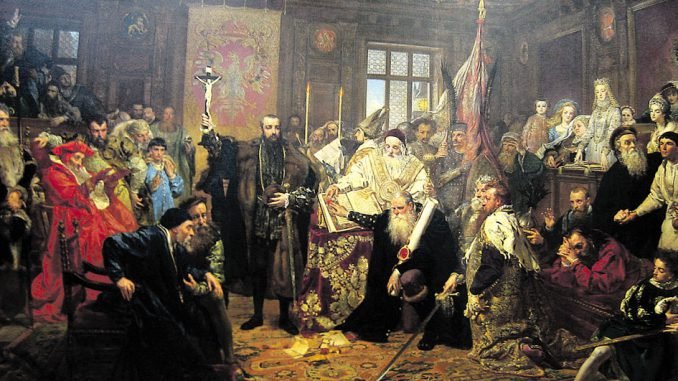
With a hot summer underway, two history-related resolutions emerged in Seimas almost at the same time and it would seem that they will both be met with controversy.
A resolution proposed by Seimas Speaker Viktoras Pranckietis, which glorifies the Lithuanian-Polish union, or Lublin Union, and its 450th anniversary will likely be an eyesore to just those Lithuanians, who are fascinated by the historical imagery of historian A. Šapoka, to whom the 1569 Act of Lublin was a national catastrophe, Valdas Bartasevičius writes in lrytas.lt
The goal of this Seimas resolution is noble of course and sends Poland a signal that Lithuania supports historical amity and wishes to strengthen bilateral relations nowadays as well.
Poland takes pride in its history and thus, the glorification of our united state will appeal to their politicians’ egos, but could also incite anti-Polish grumbling among some Lithuanians, which will be no help in resolving either the problem of writing Polish names [in Lithuanian documents] or other issues that mar our bilateral relations.
June 23 uprising
However, the resolution praising the Lublin Union is only an innocent historical gesture, while conservative L. Kasčiūnas, A. Ažubalis and P. Saudargas’ resolution, which glorifies the June 23, 1941 uprising, could become an international bomb if the document catches the attention of Jewish organisations.
Accusations of contempt toward the victims of the Holocaust are guaranteed.
It is not hard to understand, why these three conservatives had to recall the June rebellion – they are politically oriented to radically nationalist voters, who do not wish to see any black spots in Lithuania’s history and are inclined to only listen to patriotic legends.
But it would be far too risky for the Seimas to approve this resolution because it could have international consequences and antagonise Lithuanian citizens.
The resolution’s authors are urging to even compare June 23 to February 16 and March 11 as a date, which signifies the unbreakable will of the Lithuanian nation to fight for its independent state. But is this not excessive?
No doubt, the rebels, who risked their lives, could have been led by the noblest of desires, but we must not forget that in the same time, mass murder of Jews in Lithuania began and willingly or not, they were encouraged by the K. Škirpa-led Lithuanian Activist Front (LAF), which organised the uprising.
Whatever the whitewashers of history may say, on March 24, 1941, the LFA uprising preparation document Directives to Free Lithuania is openly anti-Semitic.
It states that “It is important to take this opportunity to also be rid of the Jews. Thus, it is necessary to form such a stuffy atmosphere against the Jews in the country that no Jew would dare or think that in the new Lithuania they could have even minimal rights or chances to make a living.
The goal is to make all Jews flee Lithuania together with the red Russians. The more of them leave Lithuania, the easier it will be to be rid of the Jews later.”
Issue of the Holocaust
Perhaps through their anti-Semitism, in their quest to recreate Lithuanian independence, the LAF sought to earn the favour of Nazi Germany, but knowing that almost all of the 200 thousand of our country’s Jewish community was murdered, it is impossible to close our eyes and fail to see the uprising organisers’ declarations.
Especially when the words were accompanied by horrifying actions – the troops of the LAF-formed National Work Protection battalion, which included a significant number of uprising participants, were among the first to participate in Jewish massacres. On July 4 and 6, in Kaunas’ VII fort, they shot some 3,000 Jews to death. According to testimonies, every group of tens of murderers were accompanied by only a handful of Germans.
Most likely, you cannot blame all of the LAF or all of the Lithuanian interim government formed by the uprising for the Jewish massacres. Nowadays, it is hard to comprehend under what conditions the leaders and participants of the June uprising had to act.
Nevertheless, is it not amoral to build a monument to them without seeing that under it you have the bones of murdered Jewish fellow citizens?
Politicians should do a favour for Lithuania and not stir controversial history further, instead of leaving it to historians to figure out, who were heroes, who were executioners and who were victims.


Be the first to comment